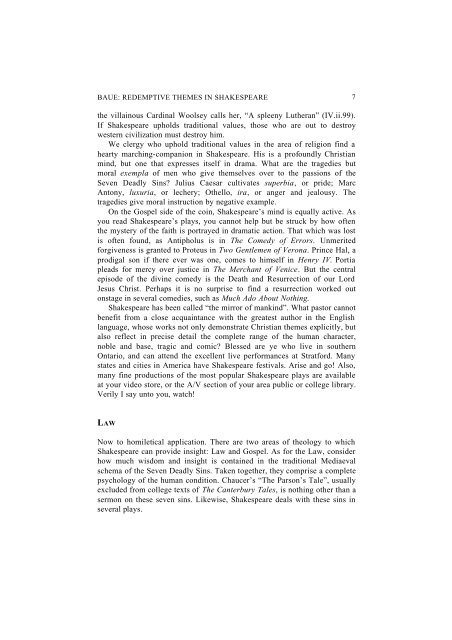LUTHERAN THEOLOGICAL REVIEW - Concordia Lutheran Seminary
LUTHERAN THEOLOGICAL REVIEW - Concordia Lutheran Seminary
LUTHERAN THEOLOGICAL REVIEW - Concordia Lutheran Seminary
Create successful ePaper yourself
Turn your PDF publications into a flip-book with our unique Google optimized e-Paper software.
BAUE: REDEMPTIVE THEMES IN SHAKESPEARE 7<br />
the villainous Cardinal Woolsey calls her, “A spleeny <strong>Lutheran</strong>” (IV.ii.99).<br />
If Shakespeare upholds traditional values, those who are out to destroy<br />
western civilization must destroy him.<br />
We clergy who uphold traditional values in the area of religion find a<br />
hearty marching-companion in Shakespeare. His is a profoundly Christian<br />
mind, but one that expresses itself in drama. What are the tragedies but<br />
moral exempla of men who give themselves over to the passions of the<br />
Seven Deadly Sins? Julius Caesar cultivates superbia, or pride; Marc<br />
Antony, luxuria, or lechery; Othello, ira, or anger and jealousy. The<br />
tragedies give moral instruction by negative example.<br />
On the Gospel side of the coin, Shakespeare’s mind is equally active. As<br />
you read Shakespeare’s plays, you cannot help but be struck by how often<br />
the mystery of the faith is portrayed in dramatic action. That which was lost<br />
is often found, as Antipholus is in The Comedy of Errors. Unmerited<br />
forgiveness is granted to Proteus in Two Gentlemen of Verona. Prince Hal, a<br />
prodigal son if there ever was one, comes to himself in Henry IV. Portia<br />
pleads for mercy over justice in The Merchant of Venice. But the central<br />
episode of the divine comedy is the Death and Resurrection of our Lord<br />
Jesus Christ. Perhaps it is no surprise to find a resurrection worked out<br />
onstage in several comedies, such as Much Ado About Nothing.<br />
Shakespeare has been called “the mirror of mankind”. What pastor cannot<br />
benefit from a close acquaintance with the greatest author in the English<br />
language, whose works not only demonstrate Christian themes explicitly, but<br />
also reflect in precise detail the complete range of the human character,<br />
noble and base, tragic and comic? Blessed are ye who live in southern<br />
Ontario, and can attend the excellent live performances at Stratford. Many<br />
states and cities in America have Shakespeare festivals. Arise and go! Also,<br />
many fine productions of the most popular Shakespeare plays are available<br />
at your video store, or the A/V section of your area public or college library.<br />
Verily I say unto you, watch!<br />
LAW<br />
Now to homiletical application. There are two areas of theology to which<br />
Shakespeare can provide insight: Law and Gospel. As for the Law, consider<br />
how much wisdom and insight is contained in the traditional Mediaeval<br />
schema of the Seven Deadly Sins. Taken together, they comprise a complete<br />
psychology of the human condition. Chaucer’s “The Parson’s Tale”, usually<br />
excluded from college texts of The Canterbury Tales, is nothing other than a<br />
sermon on these seven sins. Likewise, Shakespeare deals with these sins in<br />
several plays.













